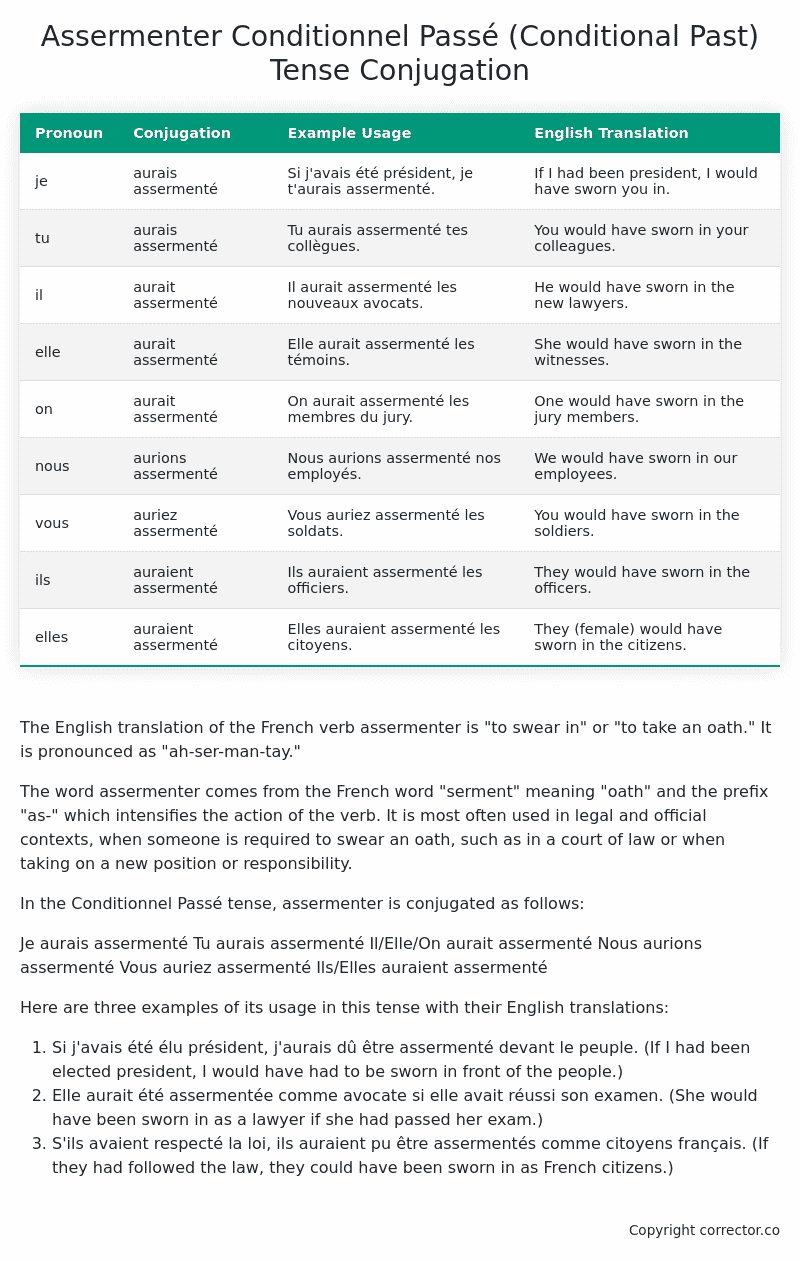Conditionnel Passé (Conditional Past) Tense Conjugation of the French Verb assermenter
Introduction to the verb assermenter
The English translation of the French verb assermenter is “to swear in” or “to take an oath.” It is pronounced as “ah-ser-man-tay.”
The word assermenter comes from the French word “serment” meaning “oath” and the prefix “as-” which intensifies the action of the verb. It is most often used in legal and official contexts, when someone is required to swear an oath, such as in a court of law or when taking on a new position or responsibility.
In the Conditionnel Passé tense, assermenter is conjugated as follows:
Je aurais assermenté
Tu aurais assermenté
Il/Elle/On aurait assermenté
Nous aurions assermenté
Vous auriez assermenté
Ils/Elles auraient assermenté
Here are three examples of its usage in this tense with their English translations:
- Si j’avais été élu président, j’aurais dû être assermenté devant le peuple. (If I had been elected president, I would have had to be sworn in front of the people.)
- Elle aurait été assermentée comme avocate si elle avait réussi son examen. (She would have been sworn in as a lawyer if she had passed her exam.)
- S’ils avaient respecté la loi, ils auraient pu être assermentés comme citoyens français. (If they had followed the law, they could have been sworn in as French citizens.)
Table of the Conditionnel Passé (Conditional Past) Tense Conjugation of assermenter
| Pronoun | Conjugation | Example Usage | English Translation |
|---|---|---|---|
| je | aurais assermenté | Si j’avais été président, je t’aurais assermenté. | If I had been president, I would have sworn you in. |
| tu | aurais assermenté | Tu aurais assermenté tes collègues. | You would have sworn in your colleagues. |
| il | aurait assermenté | Il aurait assermenté les nouveaux avocats. | He would have sworn in the new lawyers. |
| elle | aurait assermenté | Elle aurait assermenté les témoins. | She would have sworn in the witnesses. |
| on | aurait assermenté | On aurait assermenté les membres du jury. | One would have sworn in the jury members. |
| nous | aurions assermenté | Nous aurions assermenté nos employés. | We would have sworn in our employees. |
| vous | auriez assermenté | Vous auriez assermenté les soldats. | You would have sworn in the soldiers. |
| ils | auraient assermenté | Ils auraient assermenté les officiers. | They would have sworn in the officers. |
| elles | auraient assermenté | Elles auraient assermenté les citoyens. | They (female) would have sworn in the citizens. |
Other Conjugations for Assermenter.
Le Present (Present Tense) Conjugation of the French Verb assermenter
Imparfait (Imperfect) Tense Conjugation of the French Verb assermenter
Passé Simple (Simple Past) Tense Conjugation of the French Verb assermenter
Passé Composé (Present Perfect) Tense Conjugation of the French Verb assermenter
Futur Simple (Simple Future) Tense Conjugation of the French Verb assermenter
Futur Proche (Near Future) Tense Conjugation of the French Verb assermenter
Plus-que-parfait (Pluperfect) Tense Conjugation of the French Verb assermenter
Passé Antérieur (Past Anterior) Tense Conjugation of the French Verb assermenter
Futur Antérieur (Future Anterior) Tense Conjugation of the French Verb assermenter
Subjonctif Présent (Subjunctive Present) Tense Conjugation of the French Verb assermenter
Subjonctif Passé (Subjunctive Past) Tense Conjugation of the French Verb assermenter
Subjonctif Imparfait (Subjunctive Imperfect) Tense Conjugation of the French Verb assermenter
Conditionnel Présent (Conditional Present) Tense Conjugation of the French Verb assermenter
Conditionnel Passé (Conditional Past) Tense Conjugation of the French Verb assermenter (this article)
L’impératif Présent (Imperative Present) Tense Conjugation of the French Verb assermenter
L’infinitif Présent (Infinitive Present) Tense Conjugation of the French Verb assermenter
Struggling with French verbs or the language in general? Why not use our free French Grammar Checker – no registration required!
Get a FREE Download Study Sheet of this Conjugation 🔥
Simply right click the image below, click “save image” and get your free reference for the assermenter Conditionnel Passé tense conjugation!

Assermenter – About the French Conditionnel Passé (Conditional Past) Tense
Formation
Common Everyday Usage Patterns
Expressing Unreal Past Scenarios
Polite Requests or Suggestions
Expressing Doubt or Uncertainty
Interactions with Other Tenses
Conditional Present
Indicative Past Tenses
Conditional Future
Summary
Want More?
I hope you enjoyed this article on the verb assermenter. Still in a learning mood? Check out another TOTALLY random French verb conjugation!


